
“A Productive Asset for the Country:” Refugees, the League of Nations, and the Greco-Turkish Exchange, 1924-1930
“A Productive Asset for the Country:” Refugees, the League of Nations, and the Greco-Turkish Exchange, 1924-1930
Keywords: Refugees; Resettlement; Greco-Turkish Exchange; League of Nations; Henry Morgenthau;
In 1924, the League of Nations authorized a special commission to resettle the hundreds of thousands of refugees created by the Greco-Turkish War. The Refugee Settlement Commission (RSC) would be responsible for rehousing Greek refugees expelled from former Ottoman territories and resettling them in Greece. The RSC had a unique commission. In an attempt to effect a “permanent solution” to ethnic violence in the lands of the former Ottoman Empire, the League of Nations had helped broker the Treaty of Lausanne between the warring nations of Greece and Turkey that ended the conflict and authorized each nation to denaturalize and expel any Greeks in Turkey and any Turks in Greece, over one and a half million civilians in total from both countries. With the League's approval, the RSC carried out the task of resettling hundreds of thousands of refugees who had been created by international accord, forced out of their ancestral homelands, and expelled to Greece with the vague promise of citizenship, housing, and welfare. This paper follows how the Refugee Settlement Commission, a supranational organization created and legitimized by the League of Nations, sought to enact their visions of modernity and civilization through the resettlement of these refugees.
More...
